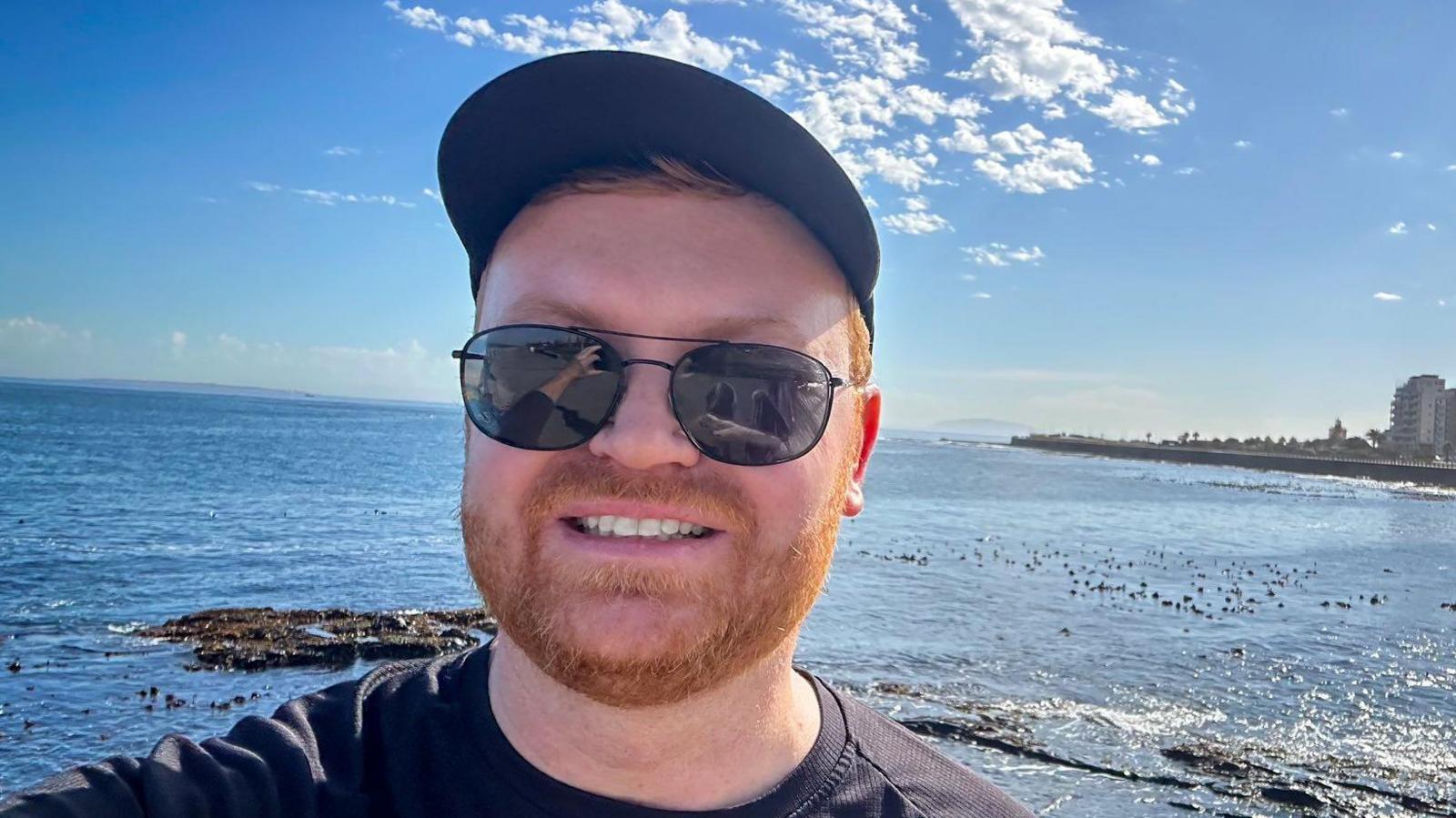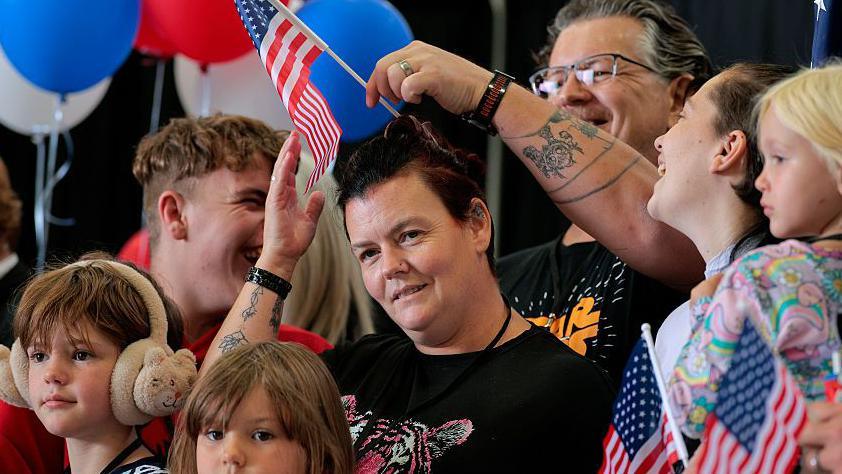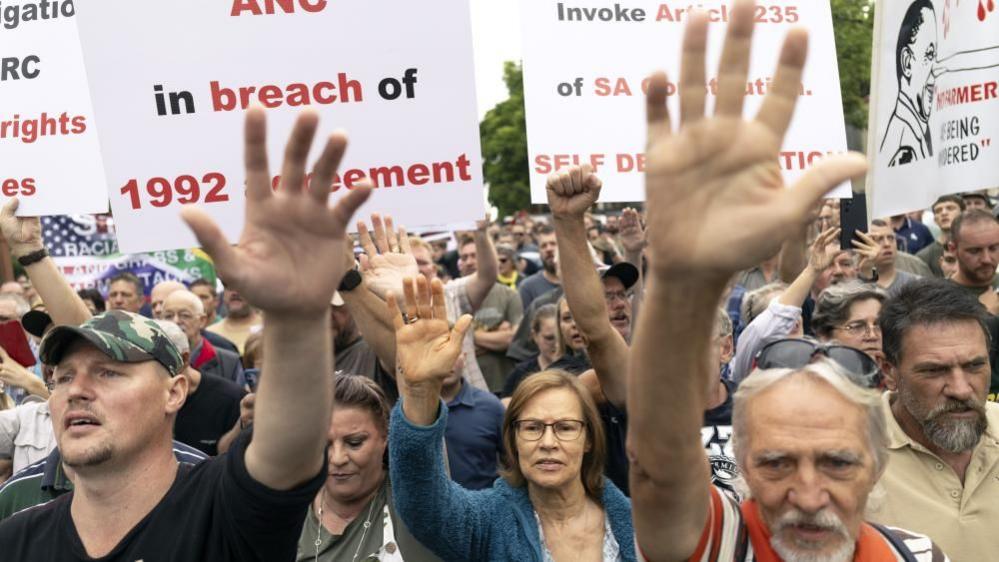Do Afrikaners want to take Trump up on his South African refugee offer?

- Published
Ulrich Janse van Vuuren has made it his passion to share and showcase some of South Africa's best features with his legion of social media followers.
The 38-year-old white South African often takes snapshots capturing scenes such as a cold Johannesburg morning, the purple Jacaranda trees famously associated with Pretoria or Cape Town's popular beachfronts.
"Promoting South Africa is something I am passionate about - I have no intention of taking up [US President Donald Trump's] offer because South Africa is my home," the proud Afrikaner tells the BBC, days after a small group of his fellow white compatriots left South Africa for their new life as refugees in the US.
The US president, and his South-Africa born ally Elon Musk, says that white Afrikaners are being persecuted in their home country, and that they are being subjected to a "genocide".
This is a claim that has been circulating for many years even though it has been widely discredited.
Although some white farmers have been attacked and killed, South Africa has one of the world's highest murder rates, so this is an issue that affects all of its citizens, whatever their race.
Watch: Why US is granting white South Africans refugee status
"For me, South Africa is home. It's a place where my roots and heritage are, where I can contribute to the story of our nation and make a meaningful impact," said Mr Janse van Vuuren, who has more than one million followers on social media.
"I'm deeply invested in South Africa's success and I am proud to be part of its journey."
And while he wished those who have taken up Trump's offer all the best in the US and urged them to "not look back", he insisted that none of them were refugees, but rather "opportunists".
"They've enjoyed more than their share of South Africa's resources and privileges, and none are fleeing racial persecution," he said.
Thirty years after the end of the racist system of apartheid, average living standards among South Africa's white community remain far higher than for the black majority.
Mr Janse van Vuuren said that the debate about the status of Afrikaners in South Africa had only served to make him "more determined than ever to step up and contribute to South Africa in every way I can".
Four centuries after the first group of Dutch settlers arrived in what is now South Africa, most Afrikaners regard themselves as fully African – as seen in the name – and no longer identify with their European roots.
But many are unhappy both with the high crime rate and the government's policies aimed at reducing economic inequality in the country – especially a law passed earlier this year that allowed the government to seize land without compensation "when it is just and equitable and in the public interest". White South Africans are 7% of the country's population, but own half of its farmland.
Some Afrikaners are farmers and see the law as being aimed at them.
Trump said the legislation prompted him to offer to help resettle "Afrikaner refugees escaping government-sponsored race-based discrimination".
The status of white South African farmers has long been a rallying cry on the right and far-right of American politics.
But despite numerous claims in the past of the systematic targeting of the country's white Afrikaner minority group, local crime statistics figures paint a different picture.
South Africa does not release crime figures based on race but the latest figures revealed that 6,953 people were murdered in the country between October and December 2024. Of these, 12 were killed in farm attacks. Of the 12, one was a farmer, while five were farm dwellers and four were employees, who are likely to have been black.

The first group of 59 Afrikaner refugees are looking forward to their new lives in the US
On Monday, the first group of 59 Afrikaners granted refugee status arrived at the Dulles airport near Washington DC after choosing to leave their home country.
The arrival of the group drew dismay and outrage across South Africa, as the country's civil society and leadership sought to dispel the claims that the white minority was being persecuted.
"They are leaving because they don't want to embrace the changes that are taking place in our country and our constitution," said South African President Cyril Ramaphosa.
He later labelled their move a "cowardly act" as he addressed farmers at a convention held in the Free State province.
The president's sentiments were echoed by many South Africans, including Mr Janse van Vuuren, who is proud of his Afrikaner origins.
While he was not raised in a farming family, he has relatives and friends in agriculture who have been victims of crime.
He said that while it was undeniable that some farmers faced "genuine threats and hardships", it was important to be cautious "when discussing claims of persecution or discrimination that portray an entire group as victims of targeted violence or systemic oppression".
While many white South Africans echo Mr Janse van Vuuren's sentiments, there are also those who see themselves as a persecuted minority.
Among them is Ilse Steenkamp, who along with her family, has applied for the programme but has not received feedback. She did not want us to use her real name.
Ms Steenkamp, 47, and her husband, both Afrikaners, were commercial farmers but said they had lost their land recently after it was invaded by people who "took over the whole farm" just as they were about to sell it in order to "downscale".
She said they had bought the land two decades ago, after the end of apartheid.
The people who invaded destroyed critical infrastructure, making it impossible to sell, she said.
Despite efforts to have them removed through the courts, Ms Steenkamp said they were forced to abandon the land as it was repossessed by the bank.
Ms Steenkamp said that while she and her family were familiar with South Africa's high crime levels and often tried to "not let it get us under", this latest attack "was the straw that broke the camel's back".
Even though her family were eager to embrace Trump's offer when it was first announced, the mother-of-three told the BBC that the decision to leave "was very difficult because you're... leaving a whole way of life".
Asked whether it was unfair that Afrikaners were being granted refugee status at a time when the US was cracking down on refugees and asylum seekers from everywhere else in the world, Ms Steenkamp said she "completely disagreed".
She pointed to assaults on farmers, saying there was a "hatred that seems to go with these attacks".
"Any farmer that has gone through that [kind of] attack and is now wanting to flee, I think should be treated as a refugee because they are fleeing from a government that will not even admit that these things are happening," she said.

Afrikaners make up about half of South Africa's white community
Sam Busà, 60, is another white South African who has applied for the refugee programme.
She is the founder of Amerikaners, a platform aimed at providing information to white South Africans interested in the US resettlement offer.
While Ms Busà, who is of English, not Afrikaner, descent, and her three sons have submitted their applications, they have not been interviewed yet.
While it was initially believed that the executive order, vague in its original wording, only applied to white Afrikaners, Ms Busà said it "clearly is targeting white South Africans".
On Monday, the US embassy in South Africa released a statement clarifying the criteria for those applying for resettlement, which said applicants need to be:
Of South African nationality
Afrikaner or from a racial minority
Able to cite an incident of past persecution or fear of persecution in the future
Responding to the criticism that they were not genuine refugees, Ms Busà said: "When someone strips away your hope for the future, even though you're not in a warzone... someone ripping away your dreams and hope for the future, that is very dramatic. It's a mental anguish and emotional abuse in a sense."
But Dr Piet Croucamp, an associate professor in political studies at South Africa's North West University, disagreed, echoing the view that those taking up this offer were not refugees as "South Africa does not persecute people".
Rather, he speculated that it may be those who have been victims of a crime and "could define their existence as an unsecure one".
Dr Croucamp, who is an Afrikaner, said that while he did not expect a significant number of white South Africans to follow suit, there would always be "opportunistic" people taking advantage of the situation.
"This is a small group of people leaving – the vast majority of Afrikaners are going nowhere and they have expressed themselves. Even the right-wing Afrikaners… [like] AfriForum and Solidarity have said they are not going anywhere. So even within Afrikaner circles, this is a small group of people," he said.
Despite their criticism of the government and its race-based policies, prominent Afrikaner lobby groups AfriForum and the Solidarity Movement have both reiterated their intention to remain in South Africa.
AfriForum said that while the government was to blame for the departure of the group granted refugee status, they would stay and continue their "efforts to help create a future for Afrikaners here at the southern tip of Africa".
This is a view with which Mr Janse van Vuuren agreed.
"While some may choose to leave as refugees, the majority of us are here to stay, working together to build a better future for all in South Africa."
More BBC stories on South Africa:

Go to BBCAfrica.com, external for more news from the African continent.
Follow us on Twitter @BBCAfrica, external, on Facebook at BBC Africa, external or on Instagram at bbcafrica, external